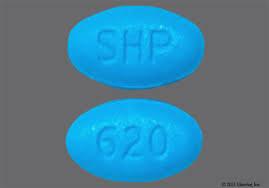Maribavir Dosage
Medically reviewed by Drugs.com. Last updated on Mar 20, 2024.
Applies to the following strengths: 200 mg
Usual Adult Dose for:
Usual Pediatric Dose for:
Additional dosage information:
Usual Adult Dose for CMV Infection
400 mg orally twice a day
Use: For the treatment of patients with posttransplant CMV infection/disease refractory to treatment (with or without genotypic resistance) with ganciclovir, valganciclovir, cidofovir, or foscarnet
Usual Pediatric Dose for CMV Infection
12 years or older:
- At least 35 kg: 400 mg orally twice a day
Use: For the treatment of patients with posttransplant CMV infection/disease refractory to treatment (with or without genotypic resistance) with ganciclovir, valganciclovir, cidofovir, or foscarnet
Renal Dose Adjustments
Mild, moderate, or severe renal dysfunction: No adjustment recommended
ESRD: Data not available
Liver Dose Adjustments
Mild (Child-Pugh A) or moderate (Child-Pugh B) liver dysfunction: No adjustment recommended
Severe liver dysfunction: Data not available
Dose Adjustments
Coadministration with carbamazepine: Maribavir 800 mg orally twice a day
Coadministration with phenytoin or phenobarbital: Maribavir 1200 mg orally twice a day
Precautions
CONTRAINDICATIONS: None
Safety and efficacy have not been established in patients younger than 12 years.
Consult WARNINGS section for additional precautions.
Dialysis
ESRD on dialysis: Data not available
Comments:
- This drug is highly bound to plasma proteins; significant removal via dialysis is unlikely.
Other Comments
Administration advice:
- Administer with or without food.
- The tablets can be administered as whole, dispersed, or crushed tablets by mouth, or as dispersed tablets through a nasogastric or orogastric tube (French size 10 or larger).
Administration of Dispersed Tablets or Crushed Tablets by Mouth:
- Step 1: Place the appropriate number of tablets for the prescribed dose into a suitable container; tablets may be crushed, if desired. Add the appropriate volume of drinking water (other liquids have not been tested) to make a suspension.
- For 400 mg dose: Use 2 tablets and 30 mL of drinking water.
- For 800 mg dose: Use 4 tablets and 60 mL of drinking water.
- For 1200 mg dose: Use 6 tablets and 90 mL of drinking water.
- Step 2: Swirl the container gently to keep the particles from settling and administer the suspension before it settles; the mixture will have a bitter taste.
- Step 3: Rinse the container with 15 mL of drinking water and administer the rinse water.
- Step 4: Repeat Step 3. Visually confirm that there are no particles in the container; if particles remain, repeat Step 3.
Administration of Dispersed Tablets through a Nasogastric (NG) or Orogastric (OG) Tube:
- Step 1: Remove the cap (if applicable) and plunger out of a 50 or 60 mL catheter-tip compatible syringe (or equivalent). Add 2 tablets into the syringe body and place the plunger back in the syringe; only 2 tablets can be administered via NG or OG tube at a time.
- Step 2: Draw 30 mL of drinking water (other liquids have not been tested) into the syringe; hold the syringe with the tip pointing upward. Pull the plunger further to a higher volume position to have some air space in the syringe, and then place the cap back on the syringe (if applicable). Shake the syringe well (being careful not to spill the contents) for about 30 to 45 seconds or until the tablets are completely dispersed.
- Step 3: Once the tablets are completely dispersed in the syringe, remove the cap from the syringe again (if applicable), attach the syringe to the NG or OG tube, and administer the dispersion before it settles.
- Step 4: Using the same syringe, draw 15 mL of water and flush through the same NG or OG tube.
- Step 5: Repeat Step 4. Visually confirm that there are no particles in the syringe; if particles remain, repeat Step 4.
- Step 6: For doses of 800 mg (4 tablets) and 1200 mg (6 tablets), repeat Steps 1 through 5 until the prescribed dose is administered. The same syringe, NG tube, or OG tube can be used.
Storage requirements:
- Store at 20C to 25C (68F to 77F); brief exposure to 15C to 30C (59F to 86F) permitted.
- Suspension: May store at room temperature for up to 8 hours
Reconstitution/preparation techniques:
- The suspension may be prepared in advance.
Monitoring:
- General: Immunosuppressant drug levels (frequently during therapy, especially after initiation and discontinuation of this drug)
Patient advice:
- Read the US FDA-approved patient labeling (Patient Information and Instructions for Use).
More about maribavir
- Check interactions
- Compare alternatives
- Side effects
- During pregnancy
- Drug class: miscellaneous antivirals
- En español
Patient resources
Other brands
Professional resources
Other brands
Related treatment guides
Further information
Always consult your healthcare provider to ensure the information displayed on this page applies to your personal circumstances.


